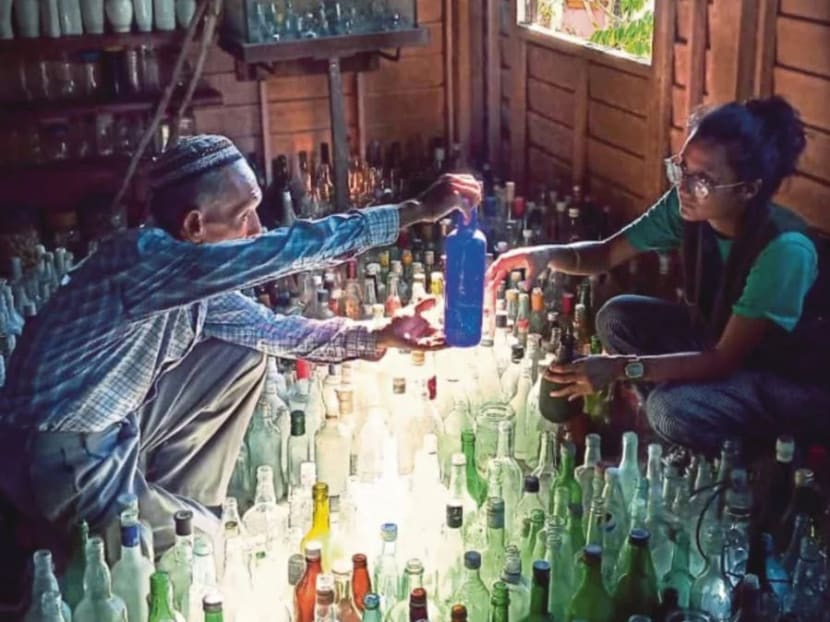Malaysia's 'bottle whisperer' collects almost 7,000 bottles from coastline
KUALA LUMPUR — It is never a good idea to keep your feelings bottled up. Instead, you should “whisper” them out to the ocean, because someone, somewhere in another part of the world, might just “listen”.
KUALA LUMPUR — It is never a good idea to keep your feelings bottled up. Instead, you should “whisper” them out to the ocean, because someone, somewhere in another part of the world, might just “listen”.
Along the east coast, that someone is Tengku Mohammad Ali Mansor, 75, from Penarik, Terengganu.
With the ocean at his doorstep, Pok Ku, as he is affectionately known, has amassed a collection of almost 7,000 bottles that have washed up along the coastlines.
Some of these delivered messages from strangers across the sea.
Standing in his home, dubbed the “Bottle House”, he reached over to one of his most treasured finds — a stout tubular bottle, tightly sealed with a cork. Inside it is a perfectly preserved scroll, handwritten in a foreign writing script.
“This bottle was floating in the sea for 14 years,” he told me. “I found it eight years ago in Besut — about 30km from here.”
With some help, he learnt that the letter was written in Korean — a lover’s plea for prayers from the unknown: “Whoever finds this bottle, I ask for your prayers so that my marriage will have the blessing of my family.”
A devout man, Pok Ku responded by breathing a prayer into his hands, in support of his faraway “friend”.
Pok Ku’s Bottle House is the culmination of a hobby that started 14 years ago. Initially, his intention was one of environmental concern.
He saw children playing with the glass bottles and debris that had washed up on the beach by monsoon waves. They were using firecrackers to detonate the bottles.
“Why are you doing that?” he asked them. “People come to the beach to play and walk on the sand. If you break the bottles, it’s dangerous for them to enjoy the beach.”
He convinced the children to collect the bottles and bring them to his house in exchange for 10 sen each.
“They must have brought around 500 bottles. I arranged them on a table and thought, ‘this could be new hobby for me’.”
Thus began Pok Ku’s bottle collection. Among his discoveries were bottles that had seemingly floated from China, Japan, Argentina and Mexico, which contain traces of culture from places beyond the sea.
He showed me another curious find — a larger, vintage, clear glass bottle.
But after its journey across the South China Sea, the letter it had once contained was damaged upon arrival.
Pok Ku tilted the bottle from side to side, allowing a small paper ball inside to roll around like a tiny marble. Through the glass, remnants of its handwritten letter plaster the bottle’s surface like the clues to a crossword puzzle.
In a fragment, you can distinguish the word “aloha”.
Just before sundown, as the golden hour crept through the windows of this makeshift museum, one can see the exhibit in its full glory — an ocean of sparkling greens, reds and blues, cast across what is left of the gallery’s aged wooden floor.
Besides bottles, the “museum” also showcases other items, such as antique glass buoys once used by fishermen to keep fishing nets, colourful glass fragments and rock-like structures that were once home to many lifeforms.
The Bottle House is not just a collection of bottles, it is a homage to the ocean — the manifestation of one man’s love for mother nature.
Pok Ku grinned and told me that he was the richest man on earth.
“I have the largest swimming pool in the world in my back garden,” he said.
As Pok Ku concludes the tour of his “museum”, I felt that he had given me valuable insights.
Of all the lessons, one that he articulated struck a chord with me: “What’s important is that when people who come to see me are happy, I too am happy. That’s all.
“The most important thing is that our faces are smiling. Because when you smile, you will have a longer, happier life.” NEW STRAITS TIMES










